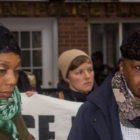
How Going to Jail Changed My Life Path, Part 1
|
The first time I went to jail, my professor sent me there. Before I could think too much about what I had agreed to do, I piled into a beat-up 12-passenger van with 11 others.
Juvenile Justice Information Exchange (https://jjie.org/series/ny-bureau/page/18/)
Juvenile justice is a complex issue — one that affects communities in different ways. The New York Metro Bureau contributes in-depth reporting of national interest and provides exclusive coverage for the JJIE from all five boroughs, as well as much of Connecticut and New Jersey.

The first time I went to jail, my professor sent me there. Before I could think too much about what I had agreed to do, I piled into a beat-up 12-passenger van with 11 others.

The fate of the authorization of the Juvenile Justice and Delinquency Prevention Act during the Trump administration is up in the air, according to judges at the National Conference on Juvenile Justice, held this year in Manhattan.

Steve Ice Waters was a kid when his family moved to Harlem from Los Angeles in 1980. Harlem was beginning to see the early signs of what would become a crack epidemic.

Paula Clarke thought the country was under attack. Groggily wiping the sleep from her eyes, she felt the house shake as a SWAT team with automatic rifles tore through the front door and charged into her Bronx home.

Every day an estimated 1,500 family members and friends of those incarcerated on New York’s Rikers Island visit their loved ones. For several months, photographer Salvador Espinoza rode the bus back and forth, documenting the stories of these people.
“It’s something we can’t sustain because it’s just this revolving door — you’re breeding kids from a young age to go into the system. I just want people to be more aware of this.”

The disciplinary trial of New York Police Department officer Richard Haste ended as the fifth anniversary of Ramarley Graham's death approaches.

NYPD Police Officer Richard Haste fatally shot 18-year-old Ramarley Graham in 2012. Take a look inside the Bronx building where it happened as reporter Zach Williams explains the importance of certain building features for the case against Haste.

The New York Police Department officer who fatally shot 18-year-old Ramarley Graham could keep his job even if a department disciplinary trial ends with a guilty verdict. A ruling is expected within 90 days.
Department discipline is likely the last recourse against Haste after two local grand juries and a federal investigation declined to criminally charge him.

The first two days of the disciplinary trial of New York Police Department officer Richard Haste revealed a departmental conflict between the pursuit of illegal firearms and rules that require an individual police officer to confront an armed suspect only in the event of an emergency.

Esther Henry can’t forget that horrible night in 2012. Something had happened downstairs in the hallway of her Bronx apartment building — something bad.